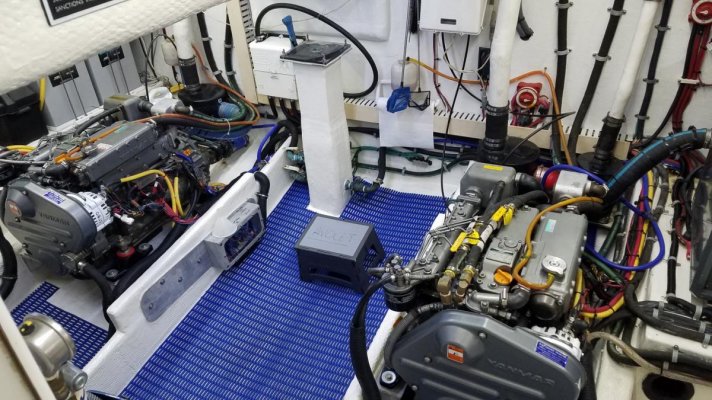A reasonably good benchmark would be the Dashew 64 FPB which uses 4.78 gal per hour at 9 kts to give a range of 6400 miles on the 3400 gal of fuel carried onboard. Of course these boats are long, narrow and light compared to most other MV.
Im not familier with the OP’s vessel, but clearly there are a lot of overpowered thirsty boats out there. An engines best specific fuel consumption will always be at WOT at lower RPM where the torque peaks. But this is of no use if that point does not match the hull performance. Now if it is a classic boat there may be considerable resistance to re-powering with an engine better matched to the hull. In New Zealand there is an outfit on the South Island that marinizes modern GM engines, the smallest of which are the 2.2 Ecotech engines
https://www.jetboatbase.co.nz/ecotec/
These engines are quite light compared to old cast iron engines, which would improve performance yet again. Its possible that a change to the transmission ratio would be needed due to the rpm characteristics of the smaller motors. Unless one does as much of the work yourself, re-powering can be very expensive so its definitely not always the best choice.
I can give some insight into the variation in fuel consumption based on technalogical drive differences with the following small boat examples:
My first small boat was a 12 foot jet boat powered by a Mercury 2 stroke 90hp powerhead mated to a mercury produced jet drive. The efficiency loss of the jet drive meant that the combination was rated as a 65 system. That boat would consume 12-15gal/hour of fuel towing a skier or person on a tube. In no wake zones you would just about pass out from the unburnt fuel vapors and had minimal steering control because of the jet drive. I think I lasted 1 season and sold the boat.
The next boat was a 15 foot speed boat with a very old 50 hp Mercury outboard. Still carburettor style 2 stroke technology, but less HP and better efficiency because of the prop. Not as fast on top speed but plenty faster than planing speed. This boat had a portable 2.5 gal gas tank, and I used to bring along a second 2.5 gal gas can as “backup”. From there I live on a chain of 7 lakes I can do a run from the second lake in the chain to the end and back and it takes more than 2 hours to complete. I can just about do it with 2.5 gal of gas, I usually run out of fuel about a mile from home. So a night and day difference, but Im also not towing a skier.
Finally, after several years of running the second boat, the wiring in the engine harness turned into dust (50 years of water penetration and corrosion) and of course Mercury has obsoleted the parts decades ago. So my new wife bought a G3 12 foot boat with a 15hp late model Honda 4 stroke engine. With this boat, which also has a 2.5 gal portable fuel tank, we can now run the chain of 6 lakes on a little over a half tank of fuel. This is again running well over planing speed but not WOT.
So I have progressed from a boat that would run through 3 full jerry cans of fuel in no time at all, to a boat that used less than 2 gal/hr to a modern 4 stroke outboard that is now down to about a gallon per hour. With the latest boat and motor we can contemplate much longer outings without running out of fuel and have reached the point where fuel cost really is not a significant factor in the cost of boating. Obviously getting good economy requires matching the installed power with your hull properties and having realistic expectations of the boats performance. Usually overpowerig is going to cost you.





